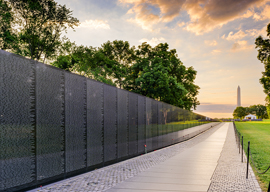
October 28, 2016

Vietnam War Memorial, Washington D.C.
Source: Bigstock
There were some 50,000 casualties in the three-day Battle of Gettysburg, more than 8,000 killed, more than 25,000 wounded, many of whom subsequently died, others missing or taken prisoner. (The figures for the Union side are well enough recorded; for the Confederates, conjectural.) According to the historian Bruce Catton there was only one recorded civilian death.
War today is different. In Iraq and Syria more civilians than combatants have been killed. Large areas of cities have been destroyed by bombs and rockets, but intense military engagements result in comparatively few deaths: comparatively, that is, with the death toll in the two World Wars. Many more British soldiers were killed in the first half hour of the Battle of the Somme than in years of engagement in Afghanistan and Iraq; likewise more Americans on the first day of the Normandy landings in 1944.
Politicians and journalists still call for military intervention in the world’s trouble spots, and initially may have public support when they do so. The support soon withers when casualty figures mount, even though, by historical standards, these are very low. Every death is of course tragic for family and friends. Yet it’s the public’s intolerance of casualties that is new and remarkable. Names of the dead on First World War memorials in two or three small villages in my native Aberdeenshire outnumber all British servicemen and -women killed in a dozen years in Afghanistan. No bodies were brought home for burial from the Somme; only a telegram for the bereaved families.
I don”t believe that either the U.S. or Britain could again engage in a major foreign war. Public opinion wouldn”t accept it. I doubt if Americans would tolerate another Vietnam, the last American war fought by drafted men. Our wars are again fought by professional forces; the British Army is smaller than at any time since the 18th century, and even so it has difficulty in recruitment and in retaining men and women beyond their first or second term of enlistment. Scotland used to be fertile recruiting ground. It no longer is. The historic regiments have disappeared, the remnant swallowed up in one infantry regiment”the Royal Regiment of Scotland. Scotland is now pacifist. The Scottish National Party has opposed every British military intervention this century.
A terrible war has been raging in Syria for years. The West has largely watched from the sidelines. Admittedly the politics have been confused, devilishly confused. Intervene against whom? On whose behalf? President Assad was first seen as the villain, but there was no appetite for an invasion to overthrow him as we destroyed Saddam Hussein and his regime. When, as prime minister, David Cameron sought parliamentary approval for bombing Assad’s forces, the House of Commons refused to grant it. President Obama said the use of chemical weapons would be a “Red Line,” but they were used, and the Red Line evaporated. In any case the question of whether there really was a moderate opposition deserving our support proved unanswerable. So our intervention has been restricted to the limited use of Special Forces and bombing and missile raids against the murdering fanatics of ISIS. In opposition politicians may clamor for action; in office they shrink from it. They do so, understandably, not only because war is by its nature terrible and in outcome uncertain, but because they know that even if there is at first public support for military intervention, that support will seep away when the body bags come home. The specters of recent wars haunt the Oval Office and number 10 Downing Street. So we dare not use even our small professional armies. In 1733, having kept out of the War of the Polish Succession, the British prime minister Sir Robert Walpole was happy to declare: “50,000 men slain in Europe this year and not a single Englishman.” Today Western politicians might make a similar claim, but not perhaps so complacently.